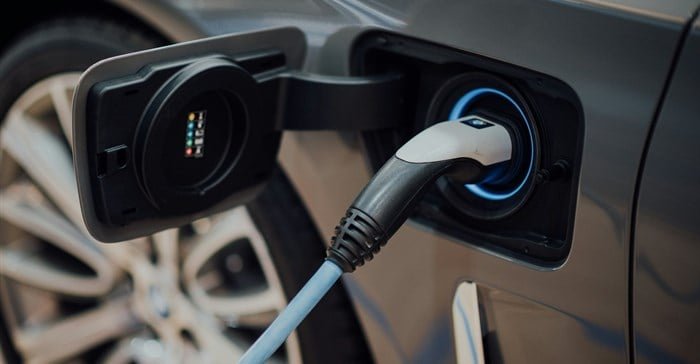Just a year ago, South Africa was battling persistent loadshedding. The idea of electric vehicles (EVs) seemed a distant dream, a luxury for a country struggling to keep the lights on. But today, the narrative has dramatically shifted. Stabilised power supply and bold government initiatives have positioned South Africa to, as is increasingly being said in key policy and business circles, “be a primary player in the EV manufacturing space.” This isn’t just about cars; it’s about seizing a transformative industrialization opportunity, boosting exports, and driving economic growth.

Source: Chuttersnap/Unsplash
South Africa’s automotive sector is a cornerstone of its industrial landscape.
It’s mature, especially compared to other African nations, and boasts a strong presence of global Original Equipment Manufacturers (OEMs) like BMW, Toyota, and Nissan.
The Automotive Production Development Programme (APDP), with its focus on “boosting production levels and job opportunities in the automotive sectors” (APDP 1) and aiming “to build a globally competitive automotive industry that drives South Africa’s economic growth” (APDP 2), has fostered a robust ecosystem.
Chinese manufacturers are also eyeing South Africa as a gateway to the African market, further enhancing the country’s potential.
A roadmap to an electric future
The Department of Trade, Industry, and Competition’s (DTIC) November 2023 Electric Vehicles White Paper recognised that the global automotive industry is “undergoing one of the most seismic shifts in its nearly 150-year history” and provides South Africa with a “major industrialisation opportunity”.
It laid out a vision for South Africa to capitalise on this opportunity, leveraging its existing manufacturing prowess, logistical infrastructure, and strategic trade agreements.
South Africa benefits from a complex web of trade agreements, opening doors to key markets:
- Southern African Development Community (SADC)
- SADC-EU Economic Partnership Agreement
- African Growth and Opportunity Act (AGOA) with the United States
- African Continental Free Trade Area (AfCFTA)
Automotive is a priority sector for AfCFTA, fueling efforts to map value chains across the continent and create opportunities for collaboration.
Incentivising the EV shift
The paper outlined 10 crucial actions to boost EV production, and the government is making good on its promises.
Specifically, there are efforts in:
- Increasing investment and funding levels, including developing cost-effective incentive support, with higher levels of investment funding “intended to catalyse EV investment in assembly and component manufacturing”.
- Facilitating and developing an electric battery regional value chain
- Introducing a temporary reduction of import duties for batteries in vehicles produced and sold in the domestic market.
- Securing or maintaining duty-free export market access for vehicles and components produced in South Africa.
The recent Taxation Laws Amendment Bill, signed into law in December 2024, is a game-changer.
Section 12V offers a 150% tax deduction for qualifying assets used in EV production, effective from March 2026 to March 2036. This powerful incentive is designed to attract significant investment.
Further proposed amendments to the APDP 2 Regulations, published in June 2024, aim to support the transition from internal combustion engines to EVs.
The introduction of the Production Rebate Certificate (PRC) offers a duty credit certificate, incentivising local manufacturers and reducing customs duties based on local value added.
Hub-and-spoke collaboration
The concept of “rules of origin” is critical within trade agreements like AfCFTA.
These rules determine whether a product qualifies for duty-free trade based on its manufacturing location. While the AfCFTA rules for automotive are still being finalised (expected by October 2025), a 40% threshold is common in other regions.
South Africa’s existing Special Economic Zones (SEZs), like Coega and Tshwane Automotive SEZ, are already well-positioned to attract investment.
However, competition is heating up across the continent, with organizations like ARISE Integrated Industrial Platforms (ARISE IIP), that:
creates, funds, conceptualises and manages industrial ecosystems throughout Africa, by identifying industrial gaps in various African nations, developing customised solutions to facilitate the sustainable local transformation of raw materials, enhance exports and encourage trade,” developing industrial ecosystems throughout Africa.
A continent-wide vision
AfCFTA and the African Automotive Manufacturers Association advocate for a “hub-and-spoke” model. This approach recognises that no single African country can do it all.
Instead, regional hubs (like South Africa) will assemble vehicles, sourcing components from various “spoke” countries across the continent.
Other African nations are already making strides in e-mobility.
Kenya, Ghana, Nigeria, Togo, and Ivory Coast are incentivising EV development, with a focus on electric buses, two- and three-wheelers, and public transport.
According to the United Nations Environment Program (UNEP):
two and three-wheelers are the priority in transitioning to e-mobility because they are the fastest-growing mode of transportation in many low and middle-income countries.
This specialisation creates complementary roles within a broader African EV value chain.
Challenges and opportunities
For this vision to succeed, seamless infrastructure, efficient logistics, and a reduction in non-tariff barriers are essential. If goods can’t move efficiently, the industry will stall.
If South Africa, in collaboration with other African nations, navigates these challenges successfully, its EV manufacturers will not only export to traditional markets like the US and Europe but also tap into the burgeoning demand within Africa.
This will unlock the immense potential of new industries and drive economic growth across the continent.
South Africa’s journey from loadshedding to EV leadership is a testament to its resilience and a beacon of hope for a sustainable, industrialised African future.











